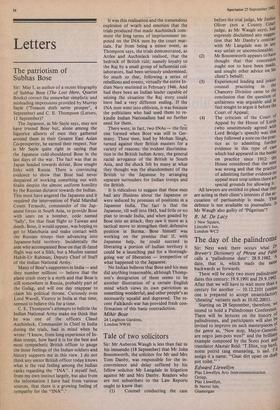Letters
The patriotism of Subhas Bose
Sir: May I, as author of a recent biography of Subhas Bose (The Lost Hero, Quartet Books) correct the somewhat simplistic and misleading impressions provided by Murray Sayle (`Treason doth never prosper', 4 September) and C. E. Thompson (Letters, 11 September)?
The Japanese, as Mr Sayle says, may not have trusted Bose but, alone among the liquorice allsorts of men they gathered around them in their Greater East Asian Co-prosperity, he earned their respect. Nor is Mr Sayle quite right in saying that the Japanese cold-shouldered Bose in the last days of the war. The fact was that as Japan headed towards defeat, Bose sought links with Russia. There is convincing evidence to show that Bose had never despaired of working something out with Stalin despite the almost uniform hostility by the Russian dictator towards the Indian. This must have angered the Japanese and it required the intervention of Field Marshal Count Terauchi, commander of the Jap- anese forces in South Asia, to provide Bose with seats on a bomber, code named `Sally', for that final flight to Taiwan and death. Bose, it would appear, was hoping to get to Manchuria and make contact with the Russian troops then advancing into Japanese-held territory. Incidentally the aide who accompanied Bose on that ill-fated flight was not a Sikh, but a Muslim named Habib-Ur Rahman, Deputy Chief of Staff of the Indian National Army.
Many of Bose's supporters in India — and they number millions — believe that the plane crash story is a myth and that Bose is still somewhere in Russia, probably part of the Gulag, and will one day reappear to claim his political throne. Curiously even Lord Wavell, Viceroy in India at that time, seemed to believe this for a time.
C. E. Thompson's attempts to belittle the Indian National Army make me think that he was one of the officers Claud Auchinleck, Commander in Chief in India during the trials, had in mind when he wrote: 'I know, from long experience of In- dian troops, how hard it is for the best and most sympathetic British officer to gauge the inner feelings of the Indian soldiers and history supports me in this view. I do not think any senior British officer today knows what is the real feeling among the Indian ranks regarding the "INA". I myself feel, from my own instinct largely, but also from the information I have had from various sources, that there is a growing feeling of sympathy for the "INA".' It was this realisation and the tremendous explosion of wrath and emotion that the trials produced that made Auchinleck com- mute the long terms of imprisonment im- posed on the INA men by the court mar- tials. Far from being a minor event, as Thompson says, the trials demonstrated, as Attlee and Auchinleck realised, that the bedrock of British rule, namely loyalty to the Raj by a small group of influential col- laborators, had been seriously undermined. So much so that, following a series of rebellions and events, virtually the entire In- dian Navy mutinied in February 1946. And had there been an Indian leader capable of seizing the situation the Raj story could have had a very different ending. If the INA men went into oblivion, it was because the politicians who had used them to re- kindle Indian Nationalism had no further need for them.
There were, in fact, two INAs — the first one formed when Bose was still in Ger- many. These men, lead by Mohan Singh, turned against their British masters for a variety of reasons: the evident discrimina- tion in the British Indian Army, the general racial arrogance of the British in South Asia, and the shock felt by many at what they thought was the abandonment of the British to the Japanese by arranging separate surrenders for Indian troops and the British.
It is ridiculous to suggest that these men had any illusions about the Japanese or were seduced by promises of positions in a Japanese India. The fact is that the Japanese, till well into 1943, had little or no plan to invade India, and when goaded by Bose into an attack, they saw it more as a tactical move to strengthen their, defensive position in Burma. Bose himself was working on the premise that if, with Japanese help, he could succeed in liberating a portion of Indian territory it could be a launching pad for a thorough- going war of liberation — irrespective of what happened to the Japanese.
No Indian believes that Bose and his men did anything treasonable, although Thomp- son's denigration of them seems to be another illustration of a certain English mind which views its own patriotism as something wonderful, and other people's as necessarily squalid and depraved. The re- cent Falklands war has provided fresh con- firmation of this basic contradiction.
Mihir Bose
24 Leighton Gardons, London NWIO


































 Previous page
Previous page